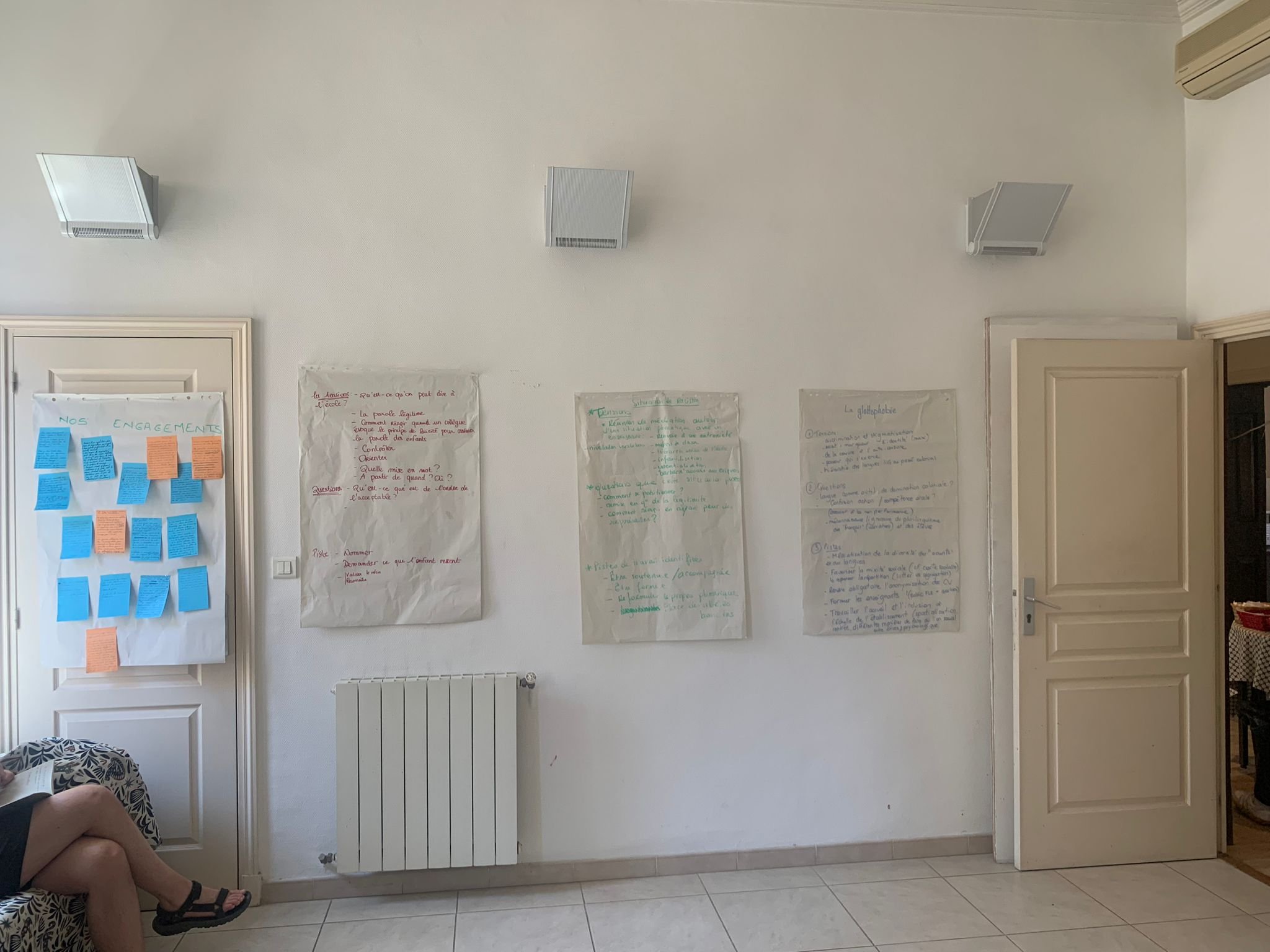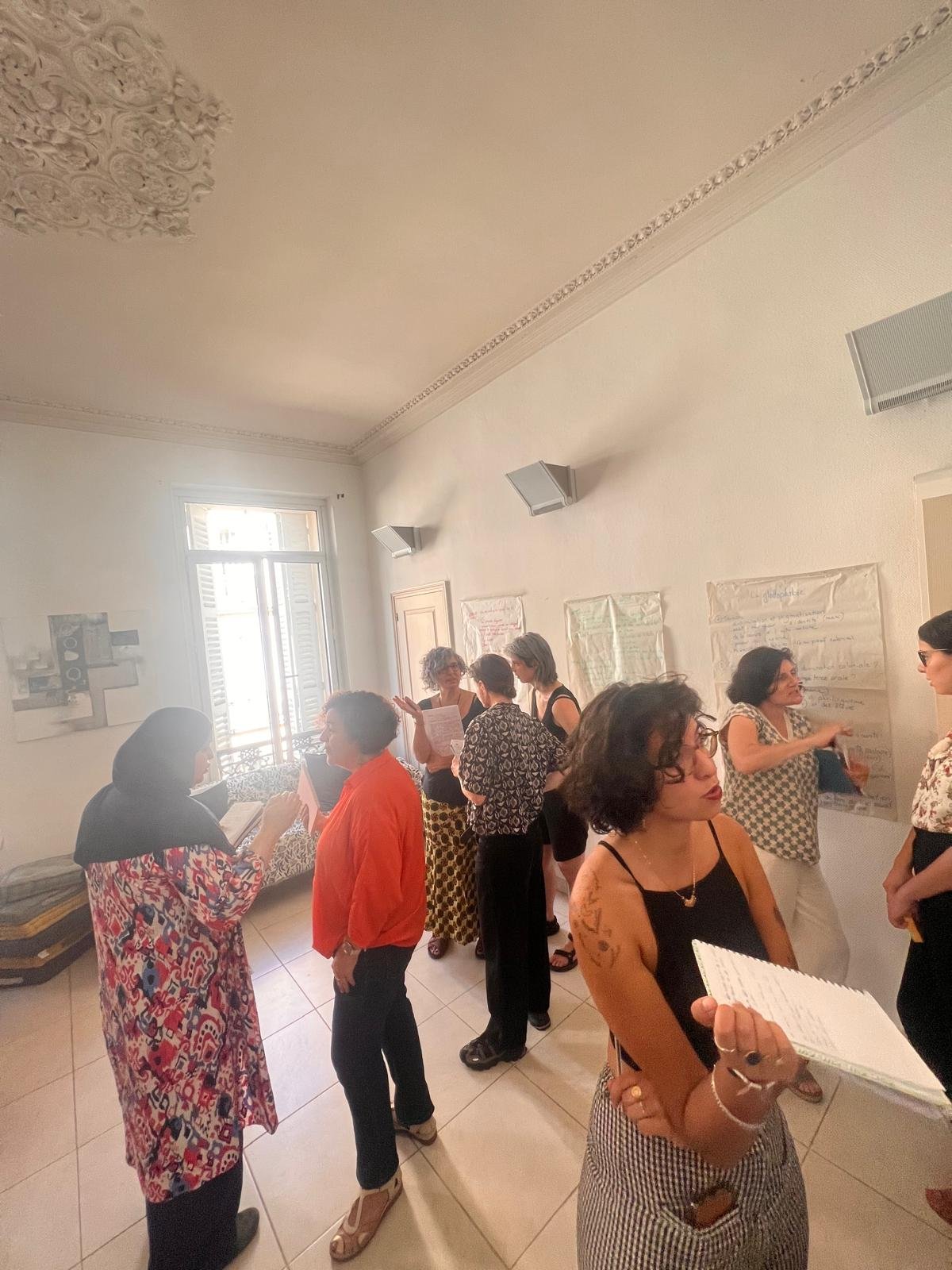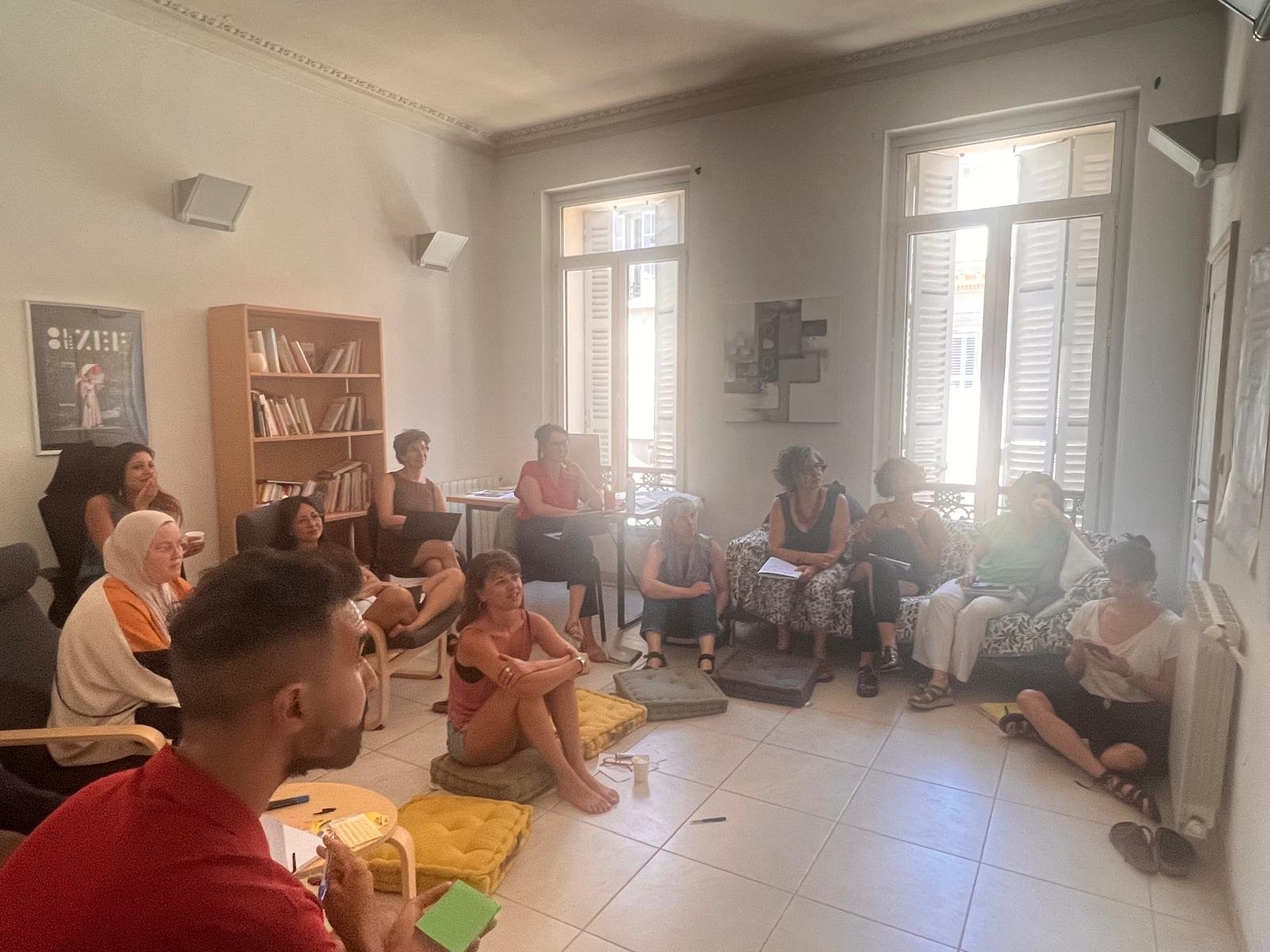Workshop on “racism in schools” in collaboration with the Marseille-based association ACT
As part of her ongoing research in Marseille, Lamia Mellal, together with Soraya Guendouz-Arab, organized a workshop entitled "Structural racism: methods, effects and strategies for action in schools", which took place on 4 and 5 July 2024 at the offices of the association Approches Cultures et Territoires (ACT). In this article, Lamia shares her experience of the workshop.
During my exploratory fieldwork in April 2022, I met Soraya Guendouz-Arab and Karima Berriche from the association ACT, as their work on the question of ethno-racial discrimination in schools was central to my research. Indeed, in the framework of my PhD thesis in anthropology and political science and as a member of the 'Deradicalizing the city' research project, I am working on the effects of the post-2015 context on the accentuation of ethno-racial discrimination in schools. The members of the association are well acquainted with the two secondary schools in the northern districts, where I conducted my survey, where they regularly organize workshops. In accordance with the approach of our project, I wanted to work with Marseilles-based associations that were already working on these issues.
A centre for resources, research and training on migration
Located in the center of Marseille, ACT defines itself as a research center on migration. Its members work actively with a range of stakeholders, including residents of working-class neighborhoods. They strive for greater social justice, working with educational professionals (teachers, educators) and committed researchers. The center offers a range of training sessions for professionals, working in schools and social centers. Their aim is to co-produce knowledge to enrich the way these professionals work on discrimination. Depending on the needs expressed, the center adapts its support methods (socio-history, physical expression, arts-based methods such as theatre, writing, painting, etc.). As part of its work with neighborhood residents, the center supports organizations that defend tenants’ interests in the context of urban renewal projects. The center also runs a seminar on "Migration and Racism", which provides an opportunity for researchers, residents and social work professionals to share knowledge and practices and organizes an annual lecture series on artistic and scientific works related to migration. In 2023, the lecture series was entitled "Body and coloniality, what racism does to the body". Researchers, psychologists, activists and artists proposed reflections that questioned the role of the body as an object of repression but also as a place of resistance and subjectivation. Thanks to its expertise and experience in this field, ACT is often asked by teachers and school principles to give talks in the classroom on issues related to migration and/or discrimination. Their approach in terms of the co-production of knowledge, and their desire to adopt a maieutic/Socratic method to help people to "give birth" to their insights, resonated strongly with the participatory research approach I wanted to set up with the students. Indeed, in contrast to existing studies on the subject, which tends to focus essentially on the institutional perspective, I wanted to produce an ethnography of the school institution from the students' point of view. In my methodological reflections, I have been inspired by the approach developed by the members of this association, who seek to work ethically throughout their various activities and productions, in a way that is useful for the marginalised and stigmatised communities with whom they work.
Through my involvement in their activities and the convergence of our subjects, we came to organize a training session together. I am often solicited by the Institut National Supérieur du Professorat et de l'Éducation INSPEE (National Higher Institute for Teaching and Education) to present my research to the teachers. The discussions have always been interesting, but restricted to the framework of the institution. I wanted to see if the content of the discussions with the teachers would change if I organized a workshop, together with the ACT, according to their approach and methods.
Two days of training on racism in schools
The training took place over two days and was attended by eleven teachers (ten women and one man, mostly white teachers and a few minorities), two civil servants who work on discrimination issues at city and metropolitan level, and a representative of a local NGO that helps families in their relations with the school system. Most of the teachers involved work in schools in working-class neighbourhoods with mostly minority students. For Soraya Guendouz-Arab, these training courses should enable a reflexive interrogation of the theoretical, political and epistemological positions of the participants, to transform their daily practices by making them more aware and committed.
ACT training courses are inspired by the new education (Neumayer, Baraër, et Vellas 2022) movement and decolonial pedagogies (Colin et Quiroz 2023; Freire et al. 2023), which aim to deconstruct the hierarchization of knowledge and build emancipatory pedagogies based on participants' subjectivities, embodied knowledge and experienced bodies (“savoirs incarnés/corps éprouvés”).
The training was divided into two phases, the first day was devoted to introducing ourselves to each other. To do this, we did a writing exercise in which each participant was asked to write "their commitments". They had to explain their reasons for following this training program and the way in which they were committed to this process. Some of the participants were already used familiar with the training offered by the organization and were aware of issues of racism in schools, but for other participants these questions were quite new. Some teachers referred to the political situation and the electoral success of the far-right party (Rassemblement National) when describing their motivations, since the training took place between the two rounds of the legislative elections in July 2024, which foresaw an unprecedented win for this party. This political context had forced some teachers to consider issues of race and racism at school.
"How can I be better equipped to deal with what's coming and how can I recognize that I might be reproducing violence without realizing it?”
"For a long time, I thought that if children wanted to succeed, they should just work for it. If someone had told me about structural racism five years ago, I'd have called it bullshit, but now I think we really need to start reflecting on this”.
Several teachers expressed having difficulties dealing with the current context and finding appropriate ways of addressing their students’ questions on the matter, especially when this came from minority students. Racialized teachers expressed the need to be better prepared to deal with the racism their students faced, but also with the racism they face from some of their colleagues. All the participants expressed the wish that this training course would help them to reflect collectively on these tensions, which are increasingly present in schools, and to develop actions to be taken with their pupils.
"How can we build common ground out of our differences and develop tools to reflect together on the issue of discrimination?”
"How can we, as racialized teachers, deliver an anti-racist message to a predominantly white staff?”
"These training courses provide breathing space and alliances that we need in order to continue to think about and develop alliances with the national education system, especially as this is becoming increasingly difficult."
After getting to know each members’ background and commitment, we asked the participants to work in smaller groups. The idea was to start from a situation related to racism that the participants had experienced in the schools, this in order to identify 1) the tensions, 2) the questions raised by the situation and 3) the axes of intervention they could identify. This exercise allowed us and the participants to put into words on the everyday realities of discrimination in schools.
The most often mentioned examples was the case of racism towards students' parents. Accusations of such as "demission parentale" (parental absenteeism) often went along with humiliations, directed at veiled mothers who would often be treated as "bad mothers". Other examples highlighted the way in which laïcité (secularism) was translated as a form of censorship towards Muslim students’ speech, that would often be treated as potentially dangerous. This example touches upon the question of the continuous discrimination between forms of speech that are treated as legitimate vs. illegitimate in schools, a question I am also exploring in my PhD research. The security context has resulted into various forms of censorship that increasingly prohibit students to express any part of their religious affiliation and origin at school. The erasure of part of students' identity at school was also raised by several teachers, as I also observed it during my survey. Indeed, a strict interpretation of laïcite, which was promoted by the document “Valeurs de la République”[1], became a moral value that was imposed on teachers and students (Lorcerie et Moignard 2017).
The first afternoon was dedicated to the presentation of my research. I wanted to use the participants' experiences, professional situations and questions as a starting point to share with them some elements of my ethnography, focusing particularly on my methodology. I wanted to share with the participants the experiences I had with students as part of my participatory research, and how they experienced this context of institutional censorship of their voices. I described how, in collaboration with Samir Akacha (a former student of the school and a podcast producer), we set up a sound creation workshop (podcast), which enabled us to co-create safe spaces with the students, allowing them to express themselves freely without fear of being punished or being reported by the police.
The second day of the training was dedicated to developing a collective strategy for action. The aim was not to provide ready-made tools, but to work together and explore the form of possible actions.
In this part, we also wanted to get our bodies moving, so the workshop consisted of walking around the room while listening to texts read by Soraya Guendouz-Arab. The aim was to write down a sentence in the text that sticked, then to stop when the reading was over and to pair up with the nearest person to discuss the sentence in question. The texts included works by Gisèle Halimi, Faïza Guène and Frantz Fanon, which dealt with the issue of struggles, alliances and racism at school. This workshop was an opportunity to link these texts and what they evoked for each of us with the personal experiences analyzed the day before.
Finally, in the last part of the training, we were able to listen to and exchange ideas with the Frenchs novelist Faïza Guène, who read a text from her upcoming book in which she talks about her experiences of racism at school as a child of immigrants. Faïza Guène gave a brilliant and detailed account of what racism does to the body, by going back to her emotions and her childhood body. Using this literary work as a starting point for further discussion, the role of schools in the experience of discrimination for children of immigrant descent was once again highlighted.
Finally, in the last part of the training, we took time to reflect on our experiences over the past two days. We wrote down what we had experienced individually and collectively. For me, it was the first time I'd allowed myself to write about racism in schools from personal experience and in a less academic way.
Tools for the future
We wanted to end with a list of things we could each do at our own level:
1) Reverse the tendency to silence students by learning to listen to what they have to say and learn to identify problematic situations and name them together with the students.
2) Create as many safe spaces as possible with and for students, to allow them to express themselves, through various forms of creative activities.
3) Encourage debate and exchange around conflicting ideas, where all viewpoints and sensitivities are considered legitimate and welcomed.
4) Encourage small group work, small bubbles where students can confide to each other, share and realize that they are not alone in experiencing these realities.
5) Work to eradicate shame as soon as it arises. Students should not feel ashamed about their multiple identities and their sense of belonging.
6) Bring together researchers, civil servants, teachers and students to work on a website that will bring together resources such as readings, workshop ideas and support materials (video, audio) to work on these issues in schools.
References :
Colin, Philippe, et Lissell Quiroz. 2023. Pensées décoloniales: Une introduction aux théories critiques d’Amérique latine. Paris: Zones.
Freire, Paulo, Irène Pereira, Elodie Dupau, et Melenn Kerhoas. 2023. La pédagogie des opprimés. 1er édition. Marseille: Agone.
Lorcerie, Françoise, et Benjamin Moignard. 2017. « L’école, la laïcité et le virage sécuritaire post‑attentats : un tableau contrasté ». Sociologie, no N° 4, vol. 8 (décembre). https://journals.openedition.org/sociologie/3391?lang=en.
Neumayer, Michel, Michel Baraër, et Etiennette Vellas. 2022. L’Éducation Nouvelle: Répondre aux défis éducatifs et sociaux de notre temps. Lyon: CHRONIQUE SOCIAL.
[1] Within the French education system, the introduction of the state of emergency, the Vigipirate and the "Great Mobilisation for the Values of the Republic" plan, in the aftermath of the attacks, have legitimised and accelerated previous policies, particularly in terms of “securing school infrastructures” (sécurisation des établissements scolaires) and the promotion of a strict "laïcité" in schools.






